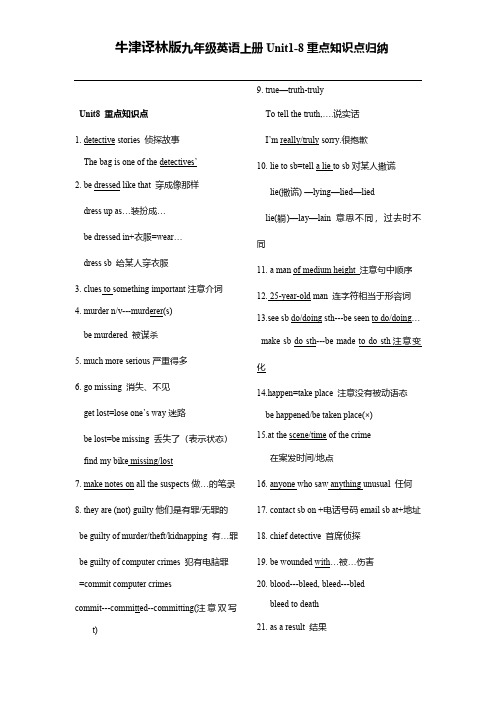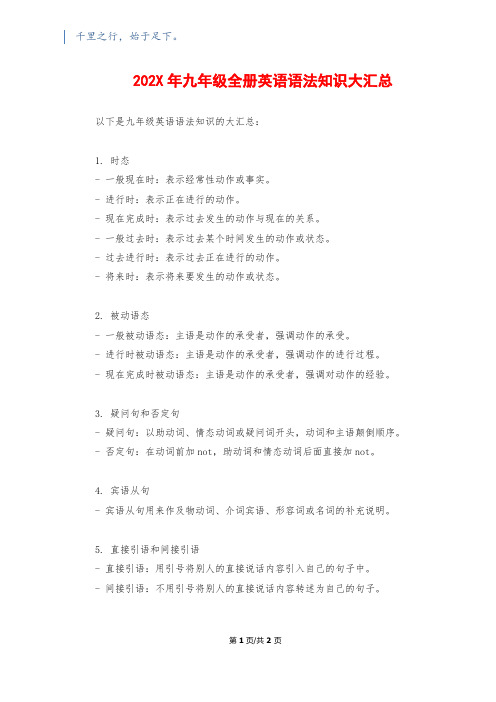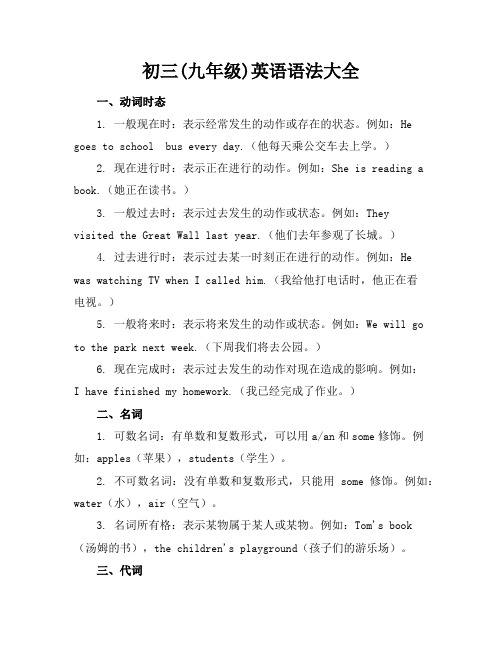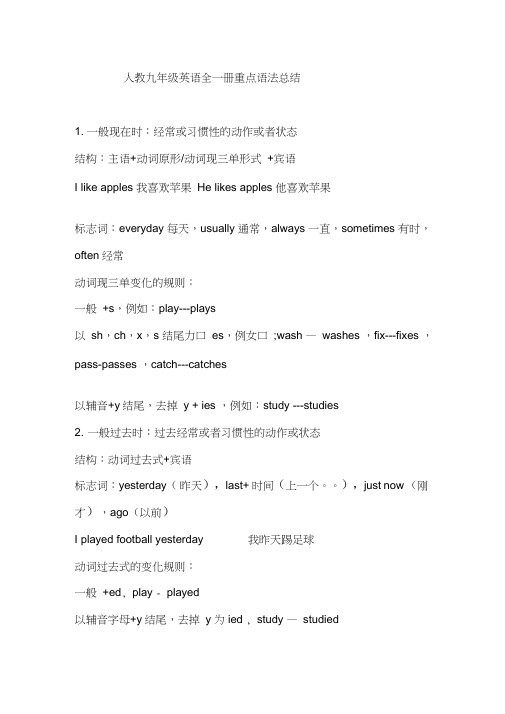九年级英语必考语法点汇总,适合各版本_1-8
牛津译林版九年级英语上册全书语法知识点归纳大全(9A Unit 1-8 )

牛津译林版九年级英语上册全书语法知识点归纳大全(9A Unit 1-8 )牛津译林版九年级英语上册全书语法知识点归纳大全Unit 1 语法和知识点复语法:1.“and” 表示并列关系,用于肯定句中。
例如:I like apples and bananas.2.“or” 表示选择关系,例如:You can stay at home or go out。
在否定句中也表示并列关系,例如:I don’t like apples or bananas.3.“but” 表示转折关系。
例如:He is very young。
but he knows a lot.4.“so” 表示因果关系。
例如:He got up late。
so he was late for school.5.“both …and…” 连接两个主语时,谓语动词用复数形式。
例如:Both Lucy and Lily study hard.6.“XXX…nor…” 和“either … or…” 和“not only…but also…” 连接两个主语时,谓语动词要和最近主语保持一致(就近原则)。
例如:XXX she knows it.知识点:1.Look at the sign。
it “says” “No smoking”。
(注意用词)2.“Make” 做“使,让”的三种用法:a。
make sb +形容词b。
make sb +动词原形c。
be made to do sth.例如:It XXX.3.“Let” 做“使,让” 时句型:XXX.4.“Agree with sb” 同意某人的意见。
5.“Eat up” 吃光。
6.“Keep…in good order” 使…保持井然有序。
7.“Show off” 。
8.形容词+ “enough to do sth” 足够…可以做某事。
9.“Come up with” 想出注意。
10.“XXX…” 对…很好奇。
牛津译林版九年级英语上册Unit1-8重点知识点归纳

Unit8 重点知识点1. detective stories 侦探故事The bag is one of the detectives’2. be dressed like that 穿成像那样dress up as…装扮成…be dressed in+衣服=wear…dress sb 给某人穿衣服3. clues to something important注意介词4. murder n/v---murderer(s)be murdered 被谋杀5. much more serious严重得多6. go missing 消失、不见get lost=lose one’s way迷路be lost=be missing 丢失了(表示状态)find my bike missing/lost7. make notes on all the suspects做…的笔录8. they are (not) guilty他们是有罪/无罪的be guilty of murder/theft/kidnapping 有…罪be guilty of computer crimes 犯有电脑罪=commit computer crimescommit---committed--committing(注意双写t)9. true—truth-trulyTo tell the truth,….说实话I’m really/truly sorry.很抱歉10. lie to sb=tell a lie to sb对某人撒谎lie(撒谎) —lying—lied—liedlie(躺)—lay—lain 意思不同,过去时不同11. a man of medium height 注意句中顺序12. 25-year-old man 连字符相当于形容词13.see sb do/doing sth---be seen to do/doing…make sb do sth---be made to do sth注意变化14.happen=take place 注意没有被动语态be happened/be taken place(×)15.at the scene/time of the crime在案发时间/地点16. anyone who saw anything unusual 任何17. contact sb on +电话号码email sb at+地址18. chief detective 首席侦探19. be wounded with…被…伤害20. blood---bleed, bleed---bledbleed to death21. as a result 结果as a result of…因为…的结果22. check the scene for more clues/fingerprints23. solve the case/crime 破案24. be single 单身的25. according to…根据…26. be charged with doing sthbe charged with theft/murder/kidnapping 27. break into 强行闯入break down损坏break out爆发break up打碎break off中断28. make sb some enemies使某人树敌29. be supposed to do sth=should do sth30. breath---breatheout of breath---breathe heavily31. offer a reword of…提供….钱的奖金32. lead to the arrest of the murdererlead—led---ledbe arrested for=be under arrest for因…被捕33. the elderly couple 看作复数形式34. have something/nothing to do with和….有/没关系35. probably 可能(放句中,修饰动词)maybe放在句子开头,修饰整个句子perhaps放句首或句末,修饰整个句子36. a master at solving cases破案方面的大师37. consider doing sth 考虑做某事consider sb+形---be considered+形consider sb as/to be---be considered as/to be 38. report sth to sb 报告某事给某人It is said/reported that…据说/报道…39. it turns/turned out that…结果是…原来是40. be in a hurry to do sth=hurry to do sthWhy are you in such a hurry?41. sometime 某一时间some time 一段时间42. kidnap-kidnapping-kidnapperbe kidnapped43. be in prison for six months=spend six months in prison44. have no criminal record 没有犯罪记录crime—criminal(犯罪的、罪犯)45. safe—safely—safetysafety tips安全建议arrive safely46.protect yourselves against crime保护你自己免受犯罪伤害47. shut –shut—shut 过去时过去分词不变48. guard against any possible danger aroundus 提防我们身边任何可能的危险49. get along/on with sb 和某人相处融洽50. do sth for a living 做某事谋生51. steal—stole—stolen52. right after就在…之后53. 定语从句的用法:(1)修饰人:who/that修饰物:which/that(2)关系代词做主语不能省略,宾语可省略(3)疑问句中,有了疑问词,关系代词不能再用which/who,用that(4)关系代词做宾语,修饰人也可用whom(5)如果人和物之间是从属关系,用whose(6)先行词前有something/anything/nothing序数词、最高级、some/any/all, theonly, the very, the last等词时只能用that(7) 定语从句中介词提前时,介词后只用which/whom,不能用who和thatUnit71.in your dreams 你做梦2.so…that---such thatso+形容词/副词so kind/carefullysuch+(a/an)+形容词+名词such a good boy---such good weather特例:如此多/少的东西,必须用soso many/few boys, so much/little milk注意:such little babies(注意little的意思)3. do sth instead---do sth instead of doing sth4. be suitable for entering the film industrybe suitable for doing sth/to do sthenter=come into, enter不能加into5. the film industry电影业agriculture and industry农业和工业(不可数)different industries不同的产业(可数)6. would rather do sth than do sthprefer to do sth 更喜欢做某事7. all-time greatest actresses空前最好的演员8. die-dead-death, be found deadthe death of sb= sb’s death9. lose—lost—lossthe loss of …失去…10. beauty—beautiful---beautifullysb’s beauty=the beauty of sb11. dream of doing sth梦想做某事12.work as a model 从事…工作13. while/before/after doing sthWhile sb+现在进行时或过去进行时14. catch one’s attention吸引某人注意力15. insist that+句子./insist on sth/doing sth16. play the (lead) role of…扮演…的(主)角play some major roles扮演一些主要的角色17. be based on以…为基础This film is based on a novelI like the film based on this novel(定语)18. mark the beginning of her successfulcareer标志她成功事业的开端19. choose sb to do..---be chosen to do sth20. be a big success=be very successful21. win an Oscar for best actress for her role22. four more=another four又四个23. make one’s final appearance24. go beyond the film industry 超越People over/under 18超过…年龄above/below 0°c 超过…温度beyond my ability/duty/12 o’clock/midnight 25. in 1950, in the 1950s区分两个短语26. so that+句子(以便,表目的)=to/in order to do sth27. work closely with…和…密切合作28. because of her efforts in this area努力29. discover发现以前未被发现的事物find找到…或者偶然发现…find out 查明、弄清楚30. have cancer得了癌症31.pass away (die)peacefully安宁去世32. attract-attractive, attract sblook attractive, attractive quality33. though/although 不能和but同时使用because 和so不能同时使用34. avoid the rush hour避免交通高峰期35. only have a T-shirt on 只穿一件体桖36. read through sth通读、仔细阅读37. mistake—mistook—mistakenmistake sb for…误认为某人是…38. attend a course/meeting/wedding参加…39. be suitable for all ages 适合所有的年龄40. fall in love with sb 爱上某人41. be on在放映42.bring dinosaurs alive on screen把恐龙活生生带到屏幕上43. there is a special offer特价44. be cancelled(注意双写)被取消45. so+动词+主语某某人也一样neither动词+主语某某人也不是so+ 主语+动词是的,的确是的Jim is a student, so am I 我也是Jim likes music, so does Tom Tom也是Jim won’t play football, neither will IJim didn’t sleep last night, neither did Lily尤其注意前后动词要一致---Jim is a good student,--- so he is的确是的---It is fine today ---so it is 的确是的46. be full of=be filled with充满47. date/place of birth 出生日期/时间48. join humour and exciting action together49.set up 建立50. far more than that 远远不止哪些51. be considered as/to be…被认为是….52. efforts in charity work慈善方面的努力Unit6 1. get bored with doing sth厌烦做某事2. a dog’s work is never done 演员做不完3. types of TV programmes 电视节目的类型4. real-life events 真实生活的事件5. there is sb doing sth 有某人在做某事6. a weekly round-up 每周的新闻摘要7. a lastest magazine 注意冠词和拼写an up-to-date magazine8. cover different sports 报道cover报道、覆盖、封面9. the number of…is…a number of+可数名词…are…a great deal of+不可数名词…is…10. interview sb (动词)采访某人have an interview with sbthere are a number of interviews with sbe-coming,include-including(逗号隔开)12. be covered live 被现场直播My grandfather is still alive活着的lively(活泼的)---lovely(可爱的)13. Asia—Asian(亚洲的)---Asian(s)亚洲人14.vote online for…在网上为…投票15.send text messages to…发送短信息到..16.win two free concert tickets单复数17. a horror film directed by…定语(被动)a boy playing football定语(主动)18. direct—director(s)19. be found dead , die—dead--death20.until直到,not until 直到…才(区分句意)21. scare—scared, get scared easily22. take a close look at…近距离的观察23. see scenes from India风景(一般用复数)24. win an award for its amazing photography25. if如果(主将从现)分清主句和从句If your homework is finished, you can leave If/whether是否,时态看具体时间whether…or…(后面有or只能用whether)26. unless(if…not…) 除非---主将从现规则27. have a chance to do sth 有机会做某事28. have little interest in…对…有很少的兴趣29. TV viewing habits 看电视的习惯30. be a waste of time 浪费时间31. receive a message from….32. be pushed into…被推进33. three man in police uniformsUnit51. something pleasantI am pleased with this trip.This trip is pleasant/unpleasant2. music—musical—musicianmusical talent ----musical instrumentsone of the greatest musicians.3. present sb with sth---present sth to sb provide sb with sth---provide sth for sb4. win—winner(s)—won--won5. show an interest in=be interested in...6. the sounds of rushing water and blowingwind7. make music with common objects8. go on to do sth继续做不同的事情go on doing sth 继续做同一件事情9. get to know great musicians开始认识…get sb to do sth使某人做某事10. be known/famous for…因…而出名be known/famous as…作为…而出名11. win an Oscar for best actress for her role12.by controlling the speed of water flowby doing sth 通过做某事through the internet通过网络13.build a bridge between the East and theWest14.bring Chinese and Western music together15. tradition---traditionaltraditional Chinese music16. in a western style用西方的风格17. dream without boundaries梦想无边18. divide—dividing ---dividing line划分线19. because与so,though与but不同时使用20.think/speak highly of…高度赞扬high---highly--height21. be open to…对…开放22. in twenty minutes---in+时间用将来时23. run towards sb朝某人跑去24. breath---breathe---breathe heavilyout of breath, take a deep breath25. hurry into…匆忙进入…hurry to do sth=be in a hurry to do sth 26. last for…持续…(延续性动词)last---lasting---have a lasting value27.make up music while playing创作28. has strong local color有强烈的地方特色29. praise sb for sth因为某事表扬某人30.have a (real) gift for…有…的天赋31. drop---dropping---droppedblow---blew---blown32. run in all directions 向四面八方跑33. encourage sb (not) to do sth34. enjoy oneself in the world of…沉醉于…的世界里Unit11.eat---ate---eaten ---eat up吃光Set up建立use up用光grow up长大put up举手,张贴pick up捡起、接2. create-creative, energy—energetic organize—organized, patient—impatient--impatience注意词性变化3. keep sth in good order使…尽然有序4. show off 炫耀5. think of=come up with相出What do you think of…?=How do you like…?你认为…怎么样?6. be curious about….对…感到好奇7. neither…nor两者都不---就近原则either…or或者..或者---就近原则not only…but also 不仅…而且…--就近原则both…and两者都---主语看作复数形式all三者或以上都none三者或以上都不either两者中任意一个8. a born artist一个天生的艺术家9. impress sb with sth用…给某人留下印象10.win high praise from…赢得来自…的赞扬11.life is like a race, you either take the lead of fall behind逆水行舟不进则退12. a miss is as good as a mile失之毫厘,缪以千里as good as 和…一样13. pay attention to doing sth注意做某事Pay no attention to…不要理会…14. work to high standards工作高标准15. can’t be too careful再仔细也不为过16.care---careful---carefullycareless---carelessly---carelessness17.devote time to doing sth奉献时间做某事18. be suitable for being an artist动词不要漏19. that’s not the case事实并非如此20. be afraid of making a speechbe afraid of doing sth21. be absent from school缺课22. recommend sb as/to be 推荐某人做…23. general manager 总经理24. connect …to/with和…相连接A railway connecting A to B(定语,主动ing)25. think twice三思而后行26.do the dishes 洗碗27. appear in a fixed order以固定的顺序出现28. divide …into…----be divided into划分29. agree with sb 同意某人Unit21. look good on sb---look good in sth2. influence our moods影响我们的心情3.sleep—sleepy---asleep区分习性和意思4. sad—sadly—sadness5. prefer doing sth to doing sth=would rather do sth than do sth不加名词prefer sth to sth可以加名词prefer to do sth6. cheer you up使你振作开心7. remind sb of sth提醒某人某事remind sb to sth 提醒某人做某事8. strong---strength9. have difficulty (in) doing sth10. decide---decision---make a decision11. 宾语从句连接词:肯动动词后(know, think, believe, be sure等)用连接词that在疑问代词后(wonder, doubt, can you tell me…?, be not sure, not know)后面用if,Whether或者特殊疑问词语序:在宾语从句中用陈述句语序疑问词+主语+动词I wonder where he is from/what he likes What’s wrong/the matter?本身就是陈述句语序,不需要再改语序时态:主句是一般现在时,从句可以用任何时态,但不能用过去完成时和过去将来时I know Jim watched TV last night主句是过去时,从句必须用过去的相应时态Tom told me Lucy was swimming then.Tom told me if he had time, he would go there 但注意分析主句时态:I have been told that……He is often told…..It is said that….看准关键词注意:考察宾语从句时,有时还考察一些其他知识点,例如延续性动词,词组搭配等12. promise sb (not) to do sth 答应做某事13.stree—stressed, feel stressed14. advice—advise, suggest—suggestion(s)advise sb to do sthsuggest doing sth---suggest sth to sbUnit31. stomach---stomachs2. be on开着(状态)turn on打开3. of one’s age 和某人一样大4. manage your time better更好的管理时间5. how to deal with---what to do with….6. have no choice but to sthchoose-choice(可数)7. stay up late熬夜stay out late呆在外面很晚8. be worth doing sth没有被动语态9. allow sb to do sth10. be strict with sb in sth对某人某方面严格11. achieve a balance between…and…12. value---valuablebe of great value=be very valuablebe of some help=be very helpful13. make a list of…列一个清单…14. my advice is worth taking值得采纳15.silent---silencekeep silent---break the silence 打破沉默16. 提建议:why not/why don’t you do sth?had better so/not do sth…. 17. be proud of…以…为骄傲be proud to sth18. go over复习19. as…as possible=as …as sb canI will get up as early as possible=I will get up as early as I can20. pronounce---pronunciation21. keep sth to oneself把某事放在某人心里Unit41. on one’s mind 在某人的心上2. courage---encourage3. try out for…参与…的选拔4. refuse to do sth拒绝做某事5. lose heart 失去信心6. get sb to do sth 使某人做某事7. succeed in doing sth =so sth successfully 注意过去时拼写succeededbe a big success=be very successful8. take notice of sb注意到某人9. when to do sth什么时候做某事When/while doing sth当做某事的时候前后都是进行时,用while10. since既然,由于wherever无论哪里whenever无论何时whoever无论谁as soon as一…就…(过去时、主将从现)11. go into hiding躲藏12. die of死于内因die from死于外因13. have sb do sth ---have sth done14.in fear of one’s life担心某人的生命15.in one’s fifties/forties五十几、四十几岁16. to sb’s surprise/sadness/joy 令某人…。
202X年九年级全册英语语法知识大汇总

千里之行,始于足下。
202X年九年级全册英语语法知识大汇总以下是九年级英语语法知识的大汇总:1. 时态- 一般现在时:表示经常性动作或事实。
- 进行时:表示正在进行的动作。
- 现在完成时:表示过去发生的动作与现在的关系。
- 一般过去时:表示过去某个时间发生的动作或状态。
- 过去进行时:表示过去正在进行的动作。
- 将来时:表示将来要发生的动作或状态。
2. 被动语态- 一般被动语态:主语是动作的承受者,强调动作的承受。
- 进行时被动语态:主语是动作的承受者,强调动作的进行过程。
- 现在完成时被动语态:主语是动作的承受者,强调对动作的经验。
3. 疑问句和否定句- 疑问句:以助动词、情态动词或疑问词开头,动词和主语颠倒顺序。
- 否定句:在动词前加not,助动词和情态动词后面直接加not。
4. 宾语从句- 宾语从句用来作及物动词、介词宾语、形容词或名词的补充说明。
5. 直接引语和间接引语- 直接引语:用引号将别人的直接说话内容引入自己的句子中。
- 间接引语:不用引号将别人的直接说话内容转述为自己的句子。
第1页/共2页锲而不舍,金石可镂。
6. 虚拟语气- 条件句虚拟语气:对与事实相反或不可能实现的条件句进行假设。
- 祝愿虚拟语气:对不可能实现的愿望或对过去不可能实现的愿望进行表达。
- 建议虚拟语气:对对方的建议或意见进行反驳或置疑。
7. 并列连词- and:连接相同性质的词语、短语或句子。
- but:表示转折,连接两个相对或对立的观点、事实或情况。
- or:表示选择,连接两个相对的选项或观点。
8. 条件状语从句- 如果从句:表示假设,条件成立时,主句发生的结果。
- 除非从句:表示唯一可能或例外的条件,主句只有在条件不满足时才发生。
这是九年级英语语法知识的一个大概总结,具体知识还有很多细节和规则需要学习和掌握。
初三(九年级)英语语法大全

初三(九年级)英语语法大全一、动词时态1. 一般现在时:表示经常发生的动作或存在的状态。
例如:He goes to school bus every day.(他每天乘公交车去上学。
)2. 现在进行时:表示正在进行的动作。
例如:She is reading a book.(她正在读书。
)3. 一般过去时:表示过去发生的动作或状态。
例如:Theyvisited the Great Wall last year.(他们去年参观了长城。
)4. 过去进行时:表示过去某一时刻正在进行的动作。
例如:He was watching TV when I called him.(我给他打电话时,他正在看电视。
)5. 一般将来时:表示将来发生的动作或状态。
例如:We will go to the park next week.(下周我们将去公园。
)6. 现在完成时:表示过去发生的动作对现在造成的影响。
例如:I have finished my homework.(我已经完成了作业。
)二、名词1. 可数名词:有单数和复数形式,可以用a/an和some修饰。
例如:apples(苹果),students(学生)。
2. 不可数名词:没有单数和复数形式,只能用some修饰。
例如:water(水),air(空气)。
3. 名词所有格:表示某物属于某人或某物。
例如:Tom's book(汤姆的书),the children's playground(孩子们的游乐场)。
三、代词1. 人称代词:I(我),you(你/你们),he(他),she(她),it(它),we(我们),they(他们)。
2. 物主代词:my(我的),your(你的/你们的),his(他的),her(她的),its(它的),our(我们的),their(他们的)。
3. 指示代词:this(这个),that(那个),these(这些),those(那些)。
人教九年级英语全一册重点语法总结

人教九年级英语全一册重点语法总结1. 一般现在时:经常或习惯性的动作或者状态结构:主语+动词原形/动词现三单形式+宾语I like apples 我喜欢苹果He likes apples 他喜欢苹果标志词:everyday 每天,usually 通常,always 一直,sometimes 有时,often经常动词现三单变化的规则:一般+s,例如:play---plays以sh,ch,x,s 结尾力口es,例女口;wash —washes ,fix---fixes ,pass-passes ,catch---catches以辅音+y结尾,去掉y + ies ,例如:study ---studies2. 一般过去时:过去经常或者习惯性的动作或状态结构:动词过去式+宾语标志词:yesterday(昨天),last+ 时间(上一个。
),just now (刚才),ago(以前)I played football yesterday 我昨天踢足球动词过去式的变化规则:一般+ed, play - played以辅音字母+y结尾,去掉y 为ied , study —studied人教九年级英语全一册重点语法总结以重读闭音节结尾,双鞋最后一个辅音字母节加ed(三明治结尾), stop —stopped以不发音的e结尾+d , move— moved3. 现在进行时:此时此刻正在进行的动作或者状态结构:Be(am, is ,are)+动词ing(现在分词)标志词:now(现在),at the moment(此刻),at once (立刻),right away(立刻)He is reading ,now 他现在正在阅读现在分词(动词ing)的变化规则一般+ing,play —playing以不发音 e 结尾,去掉 e +ing ,ride---riding3, 以重读闭音节结尾(三明治结尾),双鞋最后一个辅音字母+ing,stop —stopp ing以ie 结尾,改为y+ing,例如:lie —lying ,die —dying,tie —tying ,4. 一般将来时:将要发生的动作或者状态结构:will/ shall(第一人称疑问句)+动词原形Be going to + 动词原形标志词:tomorrow 明天,next + 段(在。
英语九年级重点知识点

英语九年级重点知识点一、语法知识点1. 时态:现在时(simple present tense)过去时(simple past tense)现在进行时(present continuous tense)过去进行时(past continuous tense)现在完成时(present perfect tense)过去完成时(past perfect tense)将来时(simple future tense)2. 语态:主动语态(active voice)被动语态(passive voice)3. 名词:可数名词与不可数名词单数名词与复数名词特殊名词变化形式4. 代词:人称代词(personal pronouns)物主代词(possessive pronouns)反身代词(reflexive pronouns)指示代词(demonstrative pronouns)不定代词(indefinite pronouns)5. 冠词:定冠词(definite article - the)不定冠词(indefinite articles - a, an)6. 形容词:基本形容词与比较级、最高级形式形容词的位置7. 副词:基本副词、比较级、最高级形式副词的位置8. 介词:常见介词及其用法介词短语的搭配9. 连词:并列连词(coordinating conjunctions)从属连词(subordinating conjunctions)转折连词、递进连词、因果连词等的使用10. 动词:不规则动词的基本形式、过去式、过去分词形式动词的时态与语态变化动词的非谓语形式(不定式、动名词、现在分词、过去分词)二、阅读技巧1. 阅读理解:提取关键信息推理与推断判断真假指代关系与代词理解2. 词汇理解:根据上下文推测单词意义掌握常见词组与固定搭配3. 主题与细节:区分主题与细节信息理解文章脉络与结构4. 推理与推断:推测作者意图推断文章未提及的信息三、写作技巧1. 书信写作:信件格式问候语与结束语的使用表达感谢、道歉、询问、请求等2. 叙述性作文:故事结构(开头、起因、经过、结局)时间、地点、人物描述动作、感觉、心理状态描写3. 议论性作文:引言与开头观点陈述与论证反驳与总结4. 描述性作文:物体外貌、颜色、形状、大小、位置描述物体功能、用途、特点说明感受、情绪、氛围描写总结:本文分为三大部分,分别介绍了英语九年级的语法知识点、阅读技巧以及写作技巧。
九年级上册英语必备知识点

九年级上册英语必备知识点一、基本语法1. 时态:一般现在时、一般过去时、一般将来时、现在进行时、过去进行时、将来进行时等。
2. 语态:主动语态、被动语态。
3. 单复数:名词的单数与复数形式的变化规则。
4. 代词:人称代词、物主代词、反身代词、指示代词、相互代词等。
5. 形容词与副词的比较级和最高级形式。
6. 直接引语和间接引语的转换。
7. 各类从句:名词性从句、定语从句、副词从句。
二、词汇与语法搭配1. 动词短语:及物动词、不及物动词、可分动词、不可分动词等。
2. 介词短语:表示时间、地点、方式等。
3. 短语动词:常见的短语动词及其搭配。
4. 名词短语:可数名词、不可数名词的用法。
5. 形容词短语:描述感受、颜色、尺寸等。
6. 副词短语:修饰动词、形容词、副词等。
7. 介词短语:用于表示时间、地点、方式等。
三、阅读理解1. 阅读技巧:全文扫读、细节理解、主旨概括等。
2. 阅读题型:选择题、填空题、匹配题等。
3. 阅读材料:包括文章、广告、通知、招聘信息等。
四、写作技巧1. 书信写作:口头通知、道歉信、建议信、感谢信等。
2. 描写人物和事物的特征和外貌。
3. 表达自己的观点和看法。
4. 小作文写作:日记、文章概要等。
五、听力技巧1. 监听时注意关键词。
2. 提高听力理解能力的练习方法。
3. 听力材料:对话、独白、新闻等。
六、口语表达1. 日常生活中的问候和寒暄。
2. 礼貌用语和常用口语表达。
3. 描述事物和人物的能力和特征。
4. 运用日常生活用语进行简单对话。
七、重点语法1. 一般现在时与一般过去时的区别。
2. 定语从句中关系代词和关系副词的使用。
3. 独立主格结构的应用。
4. 虚拟语气的用法。
八、语言技巧1. 短语动词的准确运用。
2. 形容词和副词的用法区别。
3. 能用实词代替虚词。
4. 准确运用连接词和过渡词。
以上就是九年级上册英语必备知识点的概要。
掌握这些知识点将会对学生在英语学习中起到重要的辅助作用。
九年级英语知识点归纳整理

九年级英语知识点归纳整理一、语法知识点。
1. 被动语态。
- 结构:一般现在时的被动语态:am/is/are + 过去分词;一般过去时的被动语态:was/were+过去分词;一般将来时的被动语态:will be+过去分词;含有情态动词的被动语态:情态动词+be +过去分词。
- 用法:当不知道动作的执行者是谁,或者没有必要指出动作的执行者时,使用被动语态。
例如:The bridge was built last year.(不知道谁建的桥,只强调桥被建好了)2. 定语从句。
- 关系代词:that,which,who,whom,whose。
that既可以指人也可以指物;which指物;who指人,在从句中作主语;whom指人,在从句中作宾语;whose表示所属关系,“……的”。
例如:I like the book which/that was written by Lu Xun.(先行词book是物,关系代词可用which或that);The boy who/that is standing there is my brother.(先行词boy是人,关系代词可用who或that作主语)- 关系副词:when,where,why。
when在定语从句中作时间状语;where作地点状语;why作原因状语。
例如:I still remember the day when I first met her.(先行词day表示时间,关系副词用when);This is the place where we used to live.(先行词place表示地点,关系副词用where)3. 宾语从句。
- 语序:宾语从句要用陈述句语序,即“连接词+主语+谓语+其他”。
例如:He asked me where I was going.而不是He asked me where was I going.- 连接词:that(无意义,可省略,在从句中不作成分);if/whether(“是否”,在从句中不作成分);特殊疑问词(如what,when,where,why,how等,在从句中作相应的成分)。
- 1、下载文档前请自行甄别文档内容的完整性,平台不提供额外的编辑、内容补充、找答案等附加服务。
- 2、"仅部分预览"的文档,不可在线预览部分如存在完整性等问题,可反馈申请退款(可完整预览的文档不适用该条件!)。
- 3、如文档侵犯您的权益,请联系客服反馈,我们会尽快为您处理(人工客服工作时间:9:00-18:30)。
一. 介词 by 的用法1. 意为“在…… 旁”,“靠近”。
Some are singing and dancing under a big tree. Some are drawing by the lake.有的在大树下唱歌跳舞。
有的在湖边画画儿。
2. 意为“不迟于”,“到…… 时为止”。
Your son will be all right by supper time.你的儿子在晚饭前会好的。
How many English songs had you learned by the end of last term?到上个学期末你们已经学了多少首英语歌曲?3. 表示方法、手段, 可译作“靠”、“用”、“凭借”、“通过”、“乘坐” 等。
The monkey was hanging from the tree by his tail and laughing.猴子用尾巴吊在树上哈哈大笑。
The boy’s father was so thankful that he taught Edison how to send messages by railwa y telegraph.孩子的父亲是那么的感激, 于是他教爱迪生怎样通过铁路电报来传达信息。
4. 表示“逐个”,“逐批” 的意思。
One by > 他们一个一个得在黑暗中经过这张桌子。
5. 表示“根据”,“按照” 的意思。
What time is it by your watch?你的表几点了?6. 和 take , hold 等动词连用,说明接触身体的某一部分。
I took him by the hand.我拉住了他的手。
7. 用于被动句中,表示行为主体, 常译作“被”、“由” 等。
English is spoken by many people.英语被许多人说。
(即“许多人讲英语。
”)二. 动名词(doing)动名词相当于名词, 在句子中可以做主语、宾语、表语、定语等。
1. 作主语Fighting broke out between the South and the North.南方与北方开战了。
2. 作宾语Would you mind turning down your radio a little, please?请问你介意调小一点收音机的音量吗?3. 作表语Babysister’s job is washing,cooking and taking care of the children.保姆的工作是洗衣服, 作饭和照看孩子。
4. 做定语a washing machine 一台洗衣机三. used to 的用法used to 意为过去常常做某事。
used to 的用法1. 肯定句:used 这个词没有人称的变化,to 后面接动词原形。
否定句是 didn’t use to….When I was a child, I didn’t use to like apples.当我还是孩子的时候我不喜欢苹果。
疑问形式是Did you use to…?Where did you use to live before you came here?当你来这儿之前你住哪儿?2. 含有 used to 的句子的反意疑问句不要 usedn’t + 主语, 而用 didn’t +主语。
——He used to smoke, didn’t he?——他过去常常吸烟,是吗?Yes, he did./ No, he didn’t.是的,他吸。
/ 不,他不吸。
四. 被动语态被动语态由助动词 be 加及物动词的过去分词构成,助动词 be 有时态,人称和数的变化。
被动语态的时态是由 be 的时态决定的,be 是什么时态,全句就是什么时态,be 动词后面的过去分词不变。
1. 各种时态的被动语态结构如下:一般现在时的被动语态:主语+am / is / are (not)+过去分词一般过去时的被动语态:主语+was / were +过去分词现在完成时的被动语态:主语+have /has +been +过去分词一般将来时的被动语态:主语+will +be+过去分词过去将来时的被动语态:主语+would / should + be +过去分词过去进行时的被动语态:主语+was / were + being +过去分词过去完成时的被动语态:主语+had + been + 过去分词情态动词的被动语态:情态动词+be+过去分词2. 被动语态的用法(1)不知道或没有必要说明动作的执行者是谁,不用 by+动作执行者短语。
Football is played widely all over the world.全世界都广泛地踢足球。
(2)强调动作的承受者。
The bank was robbed yesterday afternoon.昨天下午这家银行遭到抢劫。
(3)作客观说明时,常采用一种被动语态句型。
It is reported that about twenty children have died of flu in the USA.据报道美国大约二十名儿童死于流感。
3. 主动语态的句子变为被动语态的步骤(1)把原句中的宾语变为主语(2)动词改为被动形式, 即 be + 过去分词(3)原来的主语,如果需要的话,放在 by 后面;如果没必要,可省略。
五. 虚拟语气如果我们所说的不是事实,而只是一种假设、愿望、建议或是一种实现不了的空想就用虚拟语气。
注意:条件句分两种,真实条件句和虚拟条件句。
只有在虚拟(非真实)条件句中,才用虚拟语气;而在真实条件句中, 要用陈述语气.请比较:(1)If it is sunny tomorrow , we’ll go to the zoo.如果明天天气好, 我们将会去公园。
在这句话中,明天天气好是完全有可能实现的,并非虚拟、幻想,因此是真实条件句,在本句中,适用“主将从现。
”(2)If I were you , I would go at > 如果我是你的话,我立刻就走。
在这句话中,条件句“如果我是你”,但事实上,我不可能成为你,这只是假设的情况,没有实现的可能。
当条件实现的可能性很小,甚至可以说没有时,就需要用虚拟语气来表示。
虚拟语气表示和现在的事实相反,从句用一般过时,主句用“should/would/could/ might + 动词原形。
例如:If I had time, I would go for a walk.If I were invited, I would go to the dinner party.If I won a million dollars in the lottery, I would put it in the bank.If I were you , I’d wear a shirt and tie.注意:在虚拟语气的句子中,be 动词只能用 were,不能用 was。
六. must/might/could/can't1. must(1)must 表示主观看法,意为“必须”。
如:You must stay here until I come back.Must I hand in my homework right now?对 must 引导的疑问句,肯定回答为 must,否定回答为 needn’t或 don’t have to .如:—Must I finish my homework?—No, you needn’t.(2)must 也可以表示有把握的推测,意为“一定,肯定”,用于肯定句。
如: The light is>其否定形式 mustn’t表示“禁止, 不许”。
如:You mustn’t play with fire.You mustn’t be late.2. could(1)can 的过去式,意为“能、会”,表示过去的能力。
如:He could write poems when he was 10.(2)could 在疑问句中,表示委婉请求的语气,此时 could 没有过去式的意思。
如: Could you do me a favour?—Could I use your pen? —Yes, you can.(注意回答)3. mightmight 为 may 的过去式。
might 表示推测时,表示可能性低于 may(此时 might 没有过去式的意思),当请求讲时,比 may 的语气更委婉。
He is away from school. He might be sick.Might I use your dictionary?4. can(1)表示能力,一般译为“能、会”,尤其指生来具备的能力。
如:She can swim fast, but I can’t .(2)表示许可,常在口语中。
如:You can use my dictionary.(3)表示推测,意为“可能”,常用于否定句和疑问句中,此时 can’t 译为“不可能”。
如:—Can the news be true? —No, it can’t be our teacher. He is>七. 定语从句1. 定语从句的概念在复合句中,修饰某一名词或代词的从句叫定语从句。
被修饰的名词或代词叫先行词,引导定语从句的词叫关系词,定语从句一般放在先行词的后面。
2. 定语从句的关系词引导定语从句的关系词有关系代词和关系副词,常见的关系代词包括that,which,who(宾格whom,所有格 whose)等,关系副词包括 where, when, why 等。
关系代词和关系副词放在先行词及定语从句之间起连接作用,同时又作定语从句的重要成分。
3. 定语从句的分类根据定语从句与先行词的关系,定语从句可分为限制性定语从句及非限制性定语从句。
限制性定语从句紧跟先行词,主句与从句不用逗号分开,从句不可省去。
非限制性定语从句与主句之间有逗号分开,起补充说明作用,如省去,意思仍完整。
4. 关系代词的用法(1)that 既可以用于指人,也可以用于指物。
在从句中作主语、宾语或表语。
作主语时不可省略,作宾语可省略。
例如:Mary likes music that is quiet and gentle.玛丽喜欢轻柔的音乐。
(that 作主语)The coat (that) I put > 我放在桌子上的那件外套是蓝色的。
(that 作宾语)(2)which 用于指物,在句中作主语、宾语或表语。
作主语不可省略,作宾语可省略。
例如:The building which stands near the train station is a supermarket.位于火车站附近的那座大楼是一家超市。
